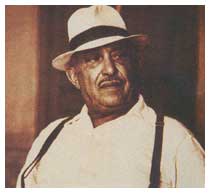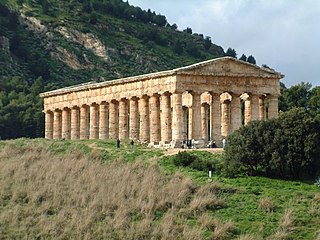Related Research Articles

Salvatore Giuliano was an Italian brigand, who rose to prominence in the disorder that followed the Allied invasion of Sicily in 1943. In September of that year, Giuliano became an outlaw after shooting and killing a police officer who tried to arrest him for black market food smuggling, at a time when 70 percent of Sicily's food supply was provided by the black market. He maintained a band of subordinates for most of his career. He was a flamboyant, high-profile criminal, attacking the police at least as often as they sought him. In addition, he was a local power-broker in Sicilian politics between 1945 and 1948, including his role as a nominal colonel for the Movement for the Independence of Sicily. He and his band were held legally responsible for the Portella della Ginestra massacre, though there is some doubt about their role in the numerous deaths which occurred.
A latifundium was originally the term used by ancient Romans for great landed estates specialising in agriculture destined for sale: grain, olive oil, or wine. They were characteristic of Magna Graecia and Sicily, Egypt, Northwest Africa and Hispania Baetica. The latifundia were the closest approximation to industrialised agriculture in antiquity, and their economics depended upon slavery.
"Mafia", as an informal or general term, is often used to describe criminal organizations that bear a strong similarity to the original Mafia in Sicily, to the Italian-American Mafia, or to other organized crime groups from Italy. The central activity of such an organization would be the arbitration of disputes between criminals, as well as the organization and enforcement of illicit agreements between criminals through the use of threat or violence. Mafias often engage in secondary activities such as gambling, loan sharking, drug-trafficking, prostitution, and fraud.

In common law systems, land tenure, from the French verb "tenir" means "to hold", is the legal regime in which land "owned" by an individual is possessed by someone else who is said to "hold" the land, based on an agreement between both individuals. It determines who can use land, for how long and under what conditions. Tenure may be based both on official laws and policies, and on informal local customs. In other words, land tenure implies a system according to which land is held by an individual or the actual tiller of the land but this person does not have legal ownership. It determines the holder's rights and responsibilities in connection with their holding. The sovereign monarch, known in England as the Crown, held land in its own right. All land holders are either its tenants or sub-tenants. Tenure signifies a legal relationship between tenant and lord, arranging the duties and rights of tenant and lord in relationship to the land. Over history, many different forms of land tenure, i.e., ways of holding land, have been established.
The Sicilian Mafia or Cosa Nostra, also referred to as simply Mafia, is a criminal society and criminal organization originating on the island of Sicily and dates back to the mid-19th century. It is an association of gangs which sell their protection and arbitration services under a common brand. The Mafia's core activities are protection racketeering, the arbitration of disputes between criminals, and the organizing and oversight of illegal agreements and transactions.

The emancipation reform of 1861 in Russia, also known as the Edict of Emancipation of Russia, was the first and most important of the liberal reforms enacted during the reign of Emperor Alexander II of Russia. The reform effectively abolished serfdom throughout the Russian Empire.

The Fasci Siciliani, short for Fasci Siciliani dei Lavoratori, were a popular movement of democratic and socialist inspiration that arose in Sicily in the years between 1889 and 1894. The Fasci gained the support of the poorest and most exploited classes of the island by channeling their frustration and discontent into a coherent programme based on the establishment of new rights. Consisting of a jumble of traditionalist sentiment, religiosity, and socialist consciousness, the movement reached its apex in the summer of 1893, when new conditions were presented to the landowners and mine owners of Sicily concerning the renewal of sharecropping and rental contracts.

Calogero Vizzini, also commonly known as "Don Calò", was a Sicilian Mafia boss of Villalba in the province of Caltanissetta, Sicily. He was considered to be one of the most influential and legendary Mafia bosses of Sicily after World War II until his death in 1954. In the media, Don Calò was often depicted as the "boss of bosses" – although such a position does not exist in the loose structure of Cosa Nostra.

Giuseppe Genco Russo was a Sicilian Mafia boss from Mussomeli in the province of Caltanissetta, Sicily. Genco Russo, also known as "Zi Peppi Jencu", was an uncouth, sly, semi-literate thug with excellent political connections. A vulgar man, as he used to spit on the floor no matter who was present, he was often photographed with bishops, bankers, civil servants and politicians. He was considered to be the arbiter of Mafia politics, and was regarded as the successor of Calogero Vizzini, who had died in 1954. Although by then a wealthy landowner and politician as a member of Christian Democracy (DC), Genco Russo still kept his mule in the house and the toilet outside, which was little more than a hole in the ground with a stone for a seat and no walls or door according to Mafia turncoat Tommaso Buscetta.

The history of Sicily has been influenced by numerous ethnic groups. It has seen Sicily controlled by powers, including Phoenician and Carthaginian, Greek, Roman, Vandal and Ostrogoth, Byzantine, Arab, Norman, Aragonese, Spanish, Austrians, British, but also experiencing important periods of independence, as under the indigenous Sicanians, Elymians, Sicels, the Greek-Siceliotes, and later as County of Sicily, and Kingdom of Sicily. The Kingdom was founded in 1130 by Roger II, belonging to the Siculo-Norman family of Hauteville. During this period, Sicily was prosperous and politically powerful, becoming one of the wealthiest states in all of Europe. As a result of the dynastic succession, the Kingdom passed into the hands of the Hohenstaufen. At the end of the 13th century, with the War of the Sicilian Vespers between the crowns of Anjou and Aragon, the island passed to the latter. In the following centuries the Kingdom entered into the personal union with the Spaniard and Bourbon crowns, while preserving effective independence until 1816. Sicily was merged with the Kingdom of Italy in 1861. Although today an Autonomous Region, with special statute, of the Republic of Italy, it has its own distinct culture.

Sciara is a comune (municipality) near the Metropolitan City of Palermo in the Italian region Sicily, located about 40 kilometres (25 mi) southeast of Palermo. As of 31 December 2004, it had a population of 2,788 and an area of 31.2 square kilometres (12.0 sq mi).
Anton Blok was a Dutch anthropologist, famous for studying the Mafia in Sicily in 1960s. Anton Blok was a visiting associate professor at the University of Michigan (1972–73) and the University of California, Berkeley in 1988. From 1973 until 1986, he served as full professor of cultural anthropology at Radboud University, Nijmegen. He then accepted a chair at the University of Amsterdam, where he remained until his retirement. For that occasion, thirty of his international colleagues and former students contributed essays in his honor, an edited volume titled as Miniature Etnografiche. Later a professor emeritus at U Amsterdam, Dr. Blok also spent one semester at Yale as a fellow. Blok died on 24 June 2024, at the age of 89.

Brigandage in Southern Italy had existed in some form since ancient times. However, its origins as outlaws targeting random travellers would evolve vastly later on to become a form of a political resistance movement, especially from the 19th century onward. During the time of the Napoleonic conquest of the Kingdom of Naples, the first signs of political resistance brigandage came to public light, as the Bourbon loyalists of the country refused to accept the new Bonapartist rulers and actively fought against them until the Bourbon monarchy had been reinstated. Some claim that the word brigandage is a euphemism for what was in fact a civil war.
In Sicily and Malta, a gabellotto or arbitriante was a person who rented farmland for short-term use. They were rural entrepreneurs who leased the lands from aristocrats more attracted to the comforts of the city. Many gabellotti were associated with, if not members of, the Mafia. Such alliances would allow them to protect themselves and their assets from bandits and cattle rustlers, as well as cut through much of the messy legalities left over from Sicily's transition from feudalism to capitalism in the early 19th century.
Feudalism in contemporary Pakistan usually refers to the power and influence of large landowning families, particularly those with very large estates in more remote areas. The adjective "feudal" in the context of Pakistan has been used to mean "a relatively small group of politically active and powerful landowners." "Feudal attitude" refers to "a combination of arrogance and entitlement." According to the Pakistan Institute of Labor Education and Research (PILER), 5% of agricultural households in Pakistan own nearly two-thirds of Pakistan's farmland.

Bernardino Verro was a Sicilian syndicalist and politician. He was involved in the Fasci Siciliani, a popular movement of democratic and socialist inspiration in 1891–1894, and became the first socialist mayor of Corleone in 1914. He was killed by the Mafia.

Nicola Alongi, was a Sicilian socialist leader, involved in the Fasci Siciliani a popular movement of democratic and socialist inspiration in 1891–1894. He was killed by the Mafia.
Agrarian reform and land reform have been a recurring theme of enormous consequence in world history. They are often highly political and have been achieved in many countries.
Serfdom has a long history that dates to ancient times.
The Sicilian Mafia was less active during the era of Fascist Italy and it was fought by Benito Mussolini's government. In June 1924, Mussolini instructed Cesare Mori to eradicate the Mafia from Sicily and on October 25, 1925, appointed Mori prefect of the Sicilian capital, Palermo.
References
- 1 2 3 Powelson, John (1987). The Story of Land -[A World History of Land Tenure and Agrarian Reform]. Cambridge, MA, USA: Lincoln Institute of Land Policy. pp. 110–111. ISBN 0899462189.
- 1 2 Jason Sardell, Economic Origins of the Mafia and Patronage System in Sicily, 2009.
- 1 2 Blok, Anton (January 1966). "Land Reform in a West Sicilian Latifondo Village: The Persistence of a Feudal Structure". Anthropological Quarterly. 39 (1): 2.
- 1 2 Oriana Bandiera, Private States and the Enforcement of Property Rights: Theory and evidence on the origins of the Sicilian mafia Archived 2012-03-19 at the Wayback Machine , 2001, pp. 8-10
- 1 2 Blok, Anton (January 1966). "Land Reform in a West Sicilian Latifondo Village: The Persistence of a Feudal Structure". Anthropological Quarterly. 39 (1): 3.
- ↑ Gambetta, Diego (1996). The Sicilian Mafia : the business of private protection. Cambridge, Mass: Harvard University Press. p. 94. ISBN 0674807421.
- ↑ D. Mack Smith. A History of Sicily: Modern Sicily, after 1713. p. 368.
- ↑ The last paragraph was copied from Sicilian Mafia.
- 1 2 3 4 5 Blok, Anton (January 1966). "Land Reform in a West Sicilian Latifondo Village: The Persistence of a Feudal Structure". Anthropological Quarterly. 39 (1): 4.
- 1 2 3 Blok, Anton (January 1966). "Land Reform in a West Sicilian Latifondo Village: The Persistence of a Feudal Structure". Anthropological Quarterly. 39 (1): 5.